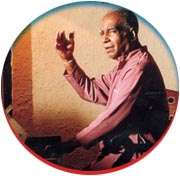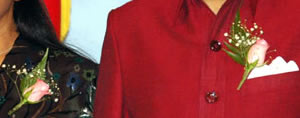
He delivered the Maldives from an embarrassment. Wannakuwattawaduge
Don Amaradeva- composer of the music for the current
Maldive national anthem.
Recipient of the Order of Padma Sri from
the President of India and the Ramon Magsaysay
Award from the President of the Philippines |
Until the late 1940s the state anthem
of the Maldives was a melody with no lyrics. It was called
the Salaamathi and was performed by the royal band on state
occasions at the Etherekoilu, the official residence of
the King of Twelve Thousand Isles and Sultan of the Maldives
in Malé. On most occasions the Salaamathi would be
preceded by a seven-gun salute fired from the Aa-Kotte Buruzu
bastion within the Etherekoilu.
In 1948 it was determined that the Salaamathi needed replacement
with lyrics to accompany a new melody. The words were composed
by a young poet and later a chief justice, Mohamed Jameel
Didi, who was my mother's first cousin.
Until very recently most Maldivians seriously believed that
music could not be composed and was derived from a universal
repertoire. Given this, there was a risk that any attempt
to compose an indigenous music for the new national anthem
would be seen by some as an affront to Allah (the Islamic
god).
Things indigenous were looked down upon then as they are
even now. Indigenous names
were already being dumped in favour of those of the colonialist
Arab masters and their Urdu-and Persian speaking allies.
In line with this trend, the words of the new national anthem
were composed to sound like an Urdu poem, bastardised generously
with as many Arabic words as possible.
Jameel Didi looked around for a tune to accompany his poem.
His uncle, the chief justice Hussain Salahuddine (who was
also my grandmother's first cousin through a different connection)
had just acquired a new-fangled clock that played an excellent
tune at the stroke of midday.
| Auld
Lang Syne
Should auld acquaintance
be forgot
and never brought to mind?
Should auld acquaintance be forgot
and days of auld lang syne?
For auld lang syne, my dear,
for auld lang syne,
we'll take a cup of kindness yet,
for auld lang syne.
Should auld acquaintance
be forgot
and never brought to mind?
Should auld acquaintance be forgot
and days of auld lang syne?
And here's a hand, my trusty friend
And gie's a hand o' thine
We'll tak' a cup o' kindness yet
For auld lang syne |
|
What
is relevant or appropriate does not seem to
be such a big issue for Maldivians. In the 1980s
the rose was adopted as the national flower.
Roses have always been an exotic and rare species
in the Maldives. Today smug officials shamelessly
sport their national flower air-freighted in
from Trivandrum (India) and elsewhere.


It is unlikely that a national
animal is so far in place. The polar bear could
well be at risk of being declared the Maldive
national animal ! |
|
Salahuddine was the father-in-law of Athireegey Mohamed Amin
Didi (later Dorhimeyna Kilegefan) who was then the Minister
of the Interior and de facto chief executive of the Maldives.
It was Amin Didi who commissioned the national anthem.
Little did Jameel Didi know that what he chose as the national
anthem of the Maldives was sung the world over by drunken
crowds at the stroke of midnight on every Christian New Year's
eve!
Salahuddine's clock survived for many years. When I was a
child my family lived in a house across a narrow lane from
Salahuddine's house. The street was called Kaulhu Guirey Magu
(crow defacating street). Although the old chief justice had
long been dead then, two of his children still lived across
the street from us and had taken great care to preserve their
clock. I remember hearing the strains of Auld Lang Syne coming
across crow defacating street. (By the way the colourful name
of this street did not survive the Maldive national inferiority
complex. Now it is called Canary Magu, still named after a
bird but without mentioning its call of nature. Crows were
a common pest in Malé at that time but it was unlikely
that any of the island's inhabitants had ever seen a canary
!)
Over the 1950s and 1960s it gradually dawned on Maldivians
what their new national anthem stood for. Although the Salaamathi
survived as the royal anthem until 1964, it did not occur
to anyone to adopt it as the national anthem. In the 1970s
there were still people who were alive and well, who had performed
the Salaamathi.
In 1972, for the first time in history, the Maldives hosted
a foreign head of state- Her Majesty Elizabeth II, Queen of
New Zealand and of her other Realms and Territories beyond
the seas.
The Maldive government of the time deemed it necessary not
to confuse Her Majesty too much at her official welcome in
Malé. Hastily they commissioned the composition of
a new melody for the national anthem. By then most Maldivians
had realised that music could actually be composed by human
beings. To my mother's relief her cousin's words were still
going to be preserved, albeit with some changes to accommodate
the then 3-year-old republic.
Her Majesty must have liked the new national anthem of the
Maldives especially composed in her honour. She sent ashore
a naval band from a frigate accompanying the Royal Yacht Britannia
to entertain her appreciative hosts. It was a very hot day
even by Maldive standards and the band played "Rain drops
keep falling...."
Gaumee Salaan
(national salute)
Gaumee mi ekuverikan mathee
thibegen kureeme salaan
Gaumee bahun gina heyo
dua kuramun kureeme salaan
Dheenaai Thakhuthah heyo hithun hurumaiy adhaa kuramun
Seedhaa vafaatherikan
mathee thibegen kureeme salaan
While we remain in this national
unity, I salute
While we say many good
prayers in the national tongue, I salute
While paying sincere respects to the Creed and the
Throne
While we remain truly
faithful, I salute

Jameel Didi
|
The new melody of the Maldive national anthem was composed
by a distinguished Sri Lankan maestro, Pandit Wannakuwattawaduge
Don Amaradeva (
Click
to listen).

